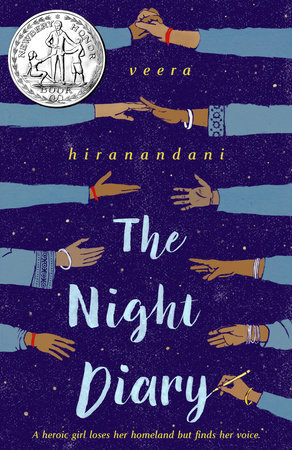A Child's-Eye View of History: The Night Diary by Veera Hiranandani
On the day in 1947 that she and her twin brother turn 12, Nisha yearns for her mother: "It was the day we came and you left..." She begins to write a diary each night. In it, she composes letters to her mother, even as the country around her fractures in the historical event known as the Partition of India.Veera Hiranandani (see my 2012 Process Talk with her) has created a sensitive, watchful child character in Nisha, who embodies the fracturing of the country, because her mother was Muslim and her father and his family are Hindu. It is a month out from the independence days of the two newly created countries, and Nisha’s letters unpack her uncovering of family secrets, the relationships they leave behind and the perilous journey they must undertake to escape a place that is no longer home. At another level, the simple, direct first person narrative in these letters delicately probes a young girl's dawning understanding of how the world works:
At another level, the simple, direct first person narrative in these letters delicately probes a young girl's dawning understanding of how the world works:
I didn't want the new India. I wanted the old one that was my home.
As well the letters document the events unfolding around Nisha, as she sees how hate can raise its ugly head readily in a place where it didn't exist before. Or did it? Was it always there, waiting for the machinations of governments and politicians to give it permission to grow? At its most personal, this is a story of a sister and brother fleeing with their doctor father and their unwilling grandmother, facing along the way the hazards of starvation, illness, and frenzied mobs fueled by religious hatred.History writ small in this way reels us close into itself, with passages like this:
But here is the question that is most on my mind. I'm afraid to say it, even afraid to write it down. I don't want to think about the answer, but my pencil needs to write it anyway: If you were alive, would we have to leave you because you are Muslim? Would they have drawn a line right through us, Mama? I don't care what the answer is. We came from your body. We will always be a part of you and this will always be my home even if it's called something else.
Here is a fictional rendering of the author's family history. Its epistolary form makes it intimate and tender. It renders one of the world's great tragedies accessible to young readers. In the end, this Newbery Honor-winning novel reminds us that love can be present even when it isn't verbally expressed. It can bind people together. It can give rise to generosity and kindness in the midst of suspicion and hate.